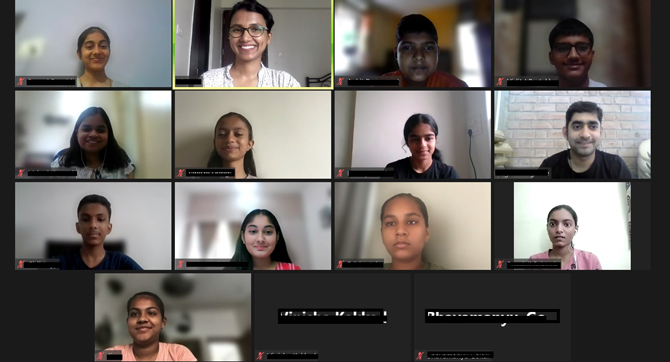Prior to this summer, the word “dialogue” meant quotes and movie scripts to Ibrahim and Soha. Seeds of Peace’s new virtual program, Dialogue Academy, changed that.
“Every time my mind was blown,” laughed Ibrahim, a 14-year-old student from India who participated in the program’s pilot phase this summer. Soha, a 16-year-old student from Pakistan, nodded along with him: “It didn’t actually feel like we were taking a class.”
Dialogue Academy is one of Seeds of Peace’s newest initiatives to foster compassionate and critical conversations across divides. Inspired by the separation caused by COVID-19, Qasim Aslam, a 2001 Pakistani Seed and Director of Pakistani Programs, said the online program was designed to further expand the impact of Seeds of Peace in a time of isolation: no need to obtain visas, no worrying about contracting or spreading COVID, no travel fees.
With Dialogue Academy, all that is required is a laptop and an internet connection.
“The program has the potential to ramp up our outreach to 100,000 students a year in about five years, if we have the right resources,” Qasim said.
With the support of a U.S. State Department grant, the Academy offered its first course, Essentials of Dialogue, on Zoom to approximately 70 Indian and Pakistani students over the summer.
The daily lessons varied, from learning about the power of groups of people through a video on mobs, to students taking an organizing role establishing school dress-code policy. Each activity worked to explore different perspectives, understand the importance of listening and dialogue, and learn their different types and applications.
“The most important thing is that everything starts with you,” Shweta Patole, the project’s director, said describing the program’s first steps. “The deeper you understand yourself, the better you’ll be able to understand everybody else.”
While the course gave students skills to begin immediately navigating conflict within their homes, schools, and communities, for many, it also provided their first opportunity to meet someone from the “other side.” Ibrahim was one of many Indian participants who had never met someone from Pakistan.
“But here diversity was a positive thing because we came to know about each other, they were informative, and we really connected to each other,” he said.
In a short amount of time, Shweta said that the course transformed from a class where students were shy to turn on their cameras, to a space where they could be vulnerable, listen with respect to the stories of their peers from across the border, and share their own as well.
“I learnt how important it is to respect others’ cultural beliefs and religion,” said Haleema Sadia, one of the participants. “They also taught me how to create safe spaces in the environment for other people to be comfortable around me.”
Future plans for Dialogue Academy include offering both live and self-paced options, as well as courses on mediation and facilitation. Focusing for now in India and Pakistan, the hope is to expand Dialogue Academy both within the two countries, and then, internationally.
“Imagine if this program is available to every school, to every student, regardless of whether Seeds of Peace is already on the ground in their community,” said Seeds of Peace Associate Director Renee Atkinson. “For some students, it will really spark something, and they’ll apply for more in-depth programs with a foundation for deeper and more meaningful conversations and action. And for others, at least they will have the tools to apply within their homes, schools, and communities. It’s a powerful thing to imagine.”
To be clear: The program is not designed to take the place of, or to be compared to, an in-depth dialogue experience like the Seeds of Peace Camp. But by eliminating physical and financial barriers to basics of the tried-and-true Seeds of Peace curriculum, it could drastically increase the number of young people equipped to navigate conflict—and to change its course across societies.
“What I realized is that, through dialogue, you can actually figure out and break down misunderstandings and conflicts instead of just acting upon your first thought,” Soha said. “I feel that if people were to learn to communicate through dialogue, we may have less violence in the world.”
Learn more about Dialogue Academy at thedialogue.academy.


